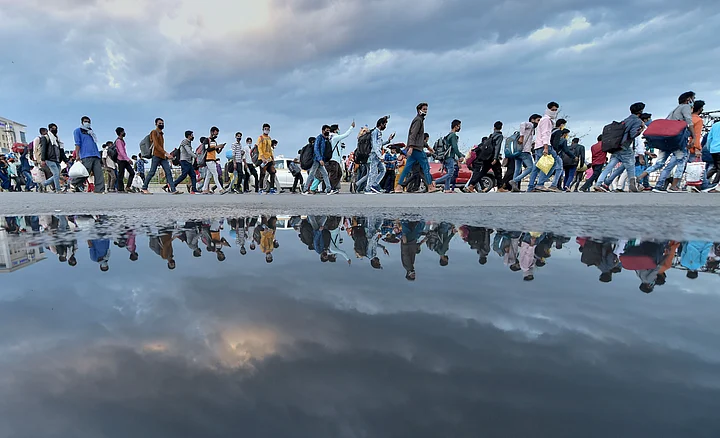How is India managing its vulnerable populations in times of COVID-19 and the continuing lockout? Pathetic stories and compelling statistics of Indian neglect of poor migrants compete and receive media time and space. Both in the national and international news.
The plight of hapless migrants in the wake of the lockdown announced on 25 March gets portrayed in minute detail without commensurate coverage of the big picture.
That the outpouring of humanity—particularly at the Anand Vihar inter-state bus terminal in Delhi—was sudden and unforeseen is clear. The reasons—mixed messages about the availability of buses combined with a natural reaction of people to escape - shorn of jobs, shelter and penniless. The predicament of thousands of stranded migrants was tragic. But as COVID-19 bourgeons across the country and herculean efforts are needed to contain it, one must look ahead and not wallow in what -could- have- beens.
Nothing Justifies Defiance
What is important is to ensure that the exodus has been managed. Preventing the egress was essential but has been depicted as inhuman and draconian; even indefensible. What is being overlooked is the fact that such movement was impermissible in the first place and could only be contained by using the provisions of the National Disaster Management Act (NDMA) 2005.
The movement and intermingling of tens of thousands of migrants would have carried enormous risks of transmission for swathes of a vulnerable population.
No hardship stories can justify any defiance of the restrictions on movement.
The unlawful religious congregation of more than 3000 people in Nizamuddin and their dispersal has spread the virus nationwide. Some 1023 Corona positive cases found in 17 States have a trail to the congregation accounting for a whopping third of all India’s cases. It can be well imagined what devastation could have taken place by permitting movement of migrants.
Commentators Are Making Absurd Suggestions
Instead of grasping this, commentators are pouring renditions about the psychology of poor migrants and their human need to be with their families. Opinion pieces rife with exaggerated accounts of poor migrants abandoned by the authorities are reported, but official data from the states is blithely ignored. Absurd suggestions that the lockdown should have been better planned and staggered out display a singular lack of understanding of the intensity, virility and capability for cross- border penetration that COVID-19 possesses.
A phased lockdown would have been a monumental blunder given India’s enormous population, transport networks and freedom of movement.
Perforce the NDMA had to be used to halt the human tide and it is good that directions were issued to set up relief camps along highways, to provide food and shelter to migrant workers who had already left and to check them medically. The rules were changed to facilitate the use of NDMA’s Relief Fund looking at the extraordinary situation which “threatened to boil over with more cases emerging ” with the states directed to start utilising the fund for food, shelter, medical relief, accommodation and clothing. The relief camps had to factor in precautions for physical distancing, for medical check-ups and segregation for quarantine and hospitalisation. By now 21,000 relief camps have been set up but no one even mentions them.
Governments Know What They Are Doing
Notwithstanding the completely avoidable melee at Anand Vihar, Delhi must be lauded for planning in anticipation of people’s needs. Four days before the lock out Delhi began from 25 March it was decided to provide free food and shelter to the needy. Today 1563 camps are in operation providing lunch and dinner to 6.3 lakh people daily. The meals are wholesome and substantial.
Delhi is not alone in this. All states have taken innovative steps to see that no poor person—migrant or not—stays without two square meals and shelter. Hardships will continue but one must not be impervious to the big picture.
COVID-19 can take millions of lives. Even tiny Singapore which held out till now has imposed a lockdown for its population which is half that of Bengaluru. Uninformed commentators who have no notion of the scale on which nationwide decisions have been and will have to continue to be taken, should desist from making vacuous suggestions.
Commenting without any knowledge of the dangers that lie ahead is in no one’s interest.
We should be thankful that the country has commendable public health and clinical competence which coupled with deep knowledge of habitations everywhere have been galvanised into action.
Opinion makers must pass up the temptation to carp from the comfort of privilege.
(Shailaja Chandra (IAS retd) has over 45 years experience of public administration focusing on governance, health management, population stabilisation and women’s empowerment. She was Secretary of the Department of Indian Systems of Medicine & Homeopathy, Ministry of Health & Family Welfare (1999-2002) and following that the Chief Secretary Delhi until 2004. She tweets at @over2shailaja. This is an opinion piece and the views expressed are the author’s own. The Quint neither endorses nor is responsible for them.)
